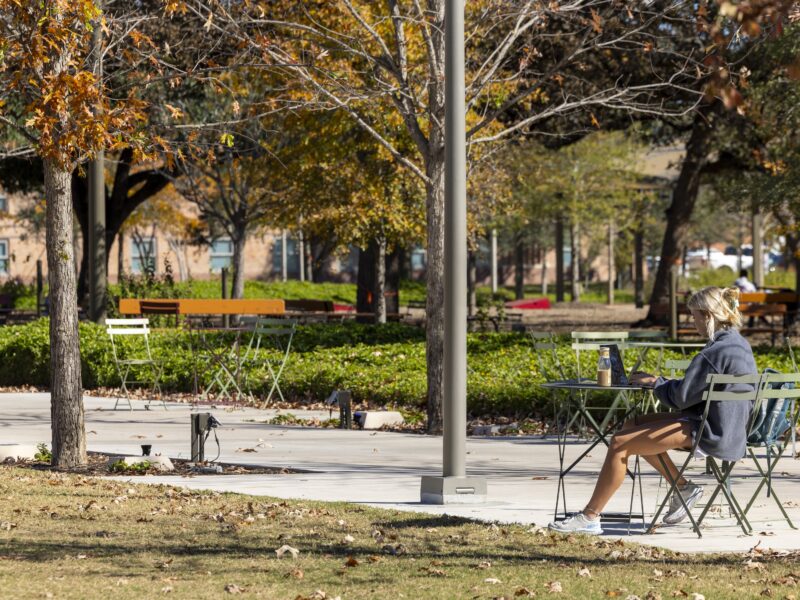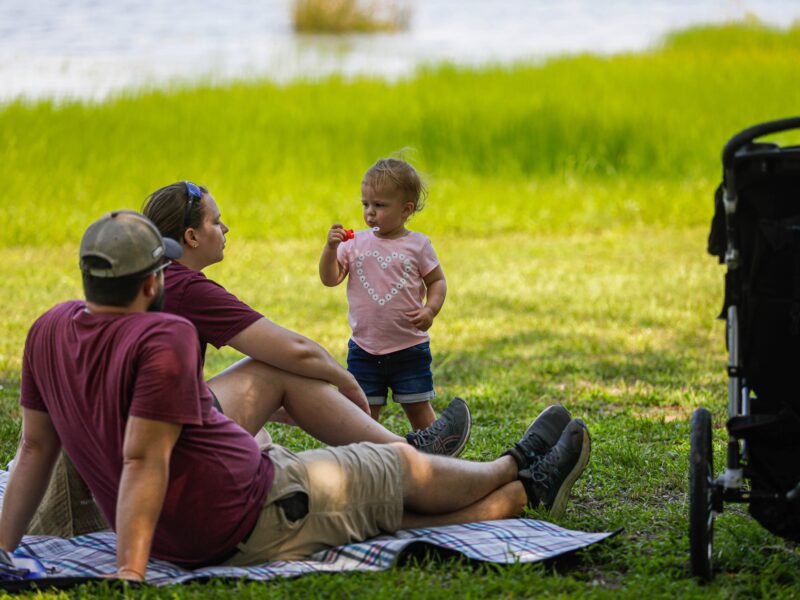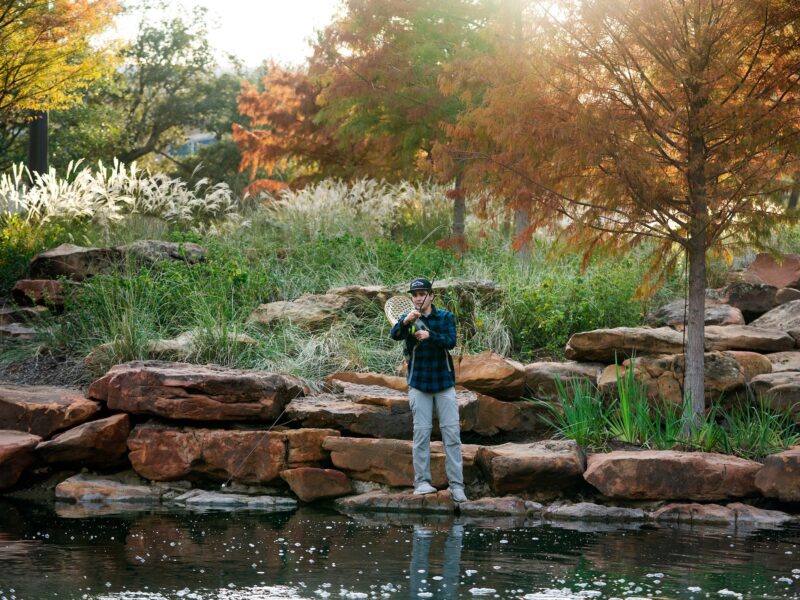Beloved Regents Professor Retires After 42 Years
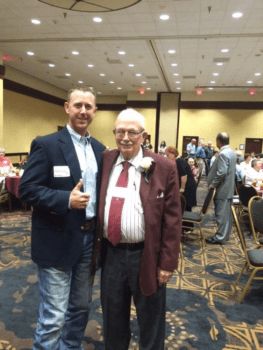
Dr. Calvin Parnell, Regents Professor and beloved and long standing faculty member, is retiring after 42 years in the Biological and Agricultural Engineering Department. His contributions and presence in the department greatly impacted the cotton industry and agricultural air quality controls.
Dr. Parnell was born in 1941 in New Mexico to cotton farmers. His parents, though not wealthy by any means, were able to fund their three children’s college education for their first two years. He attended New Mexico State University where he received his Agricultural Engineering undergraduate degree and was commissioned as a Second Lieutenant through the ROTC upon graduation. He was then employed at the USDA Cotton Ginning Research Laboratory to strengthen his foundation in preparation for his graduate studies.
Dr. Parnell attended Clemson University in South Carolina on a fellowship from the National Cotton Council, where he received his Master’s degree in Agricultural Engineering. At the suggestion of his mentor, he pursued his PhD degree. This type of degree had never been achieved within the Biological and Agricultural department at Clemson. While working on his PhD, he was hired to perform research with engineers at the USDA South Eastern Cotton Ginning Research Laboratory but was unable to complete his degree as he was called to active duty. Fortunately, he was able to complete his PhD while serving, where he was enlisted in the U.S. Army Corps of Engineers at the Ohio River Division Laboratory in construction engineering research. He ended his active duty obligations in the Army in 1970 and received his PhD in Environmental Systems Engineering. He then accepted a job with the USDA South Plains Cotton Ginning Research Laboratory in Lubbock until 1973.
In 1974, Dr. Parnell accepted a position with Texas A&M University’s Texas Agricultural Extension Service as a cotton ginning specialist where he developed educational programs for cotton producers, farmers, and ginners. During this time, he educated cotton producers on an alternative seed handling system, the adoption of the module builder system. The module builder system was developed by Professor Lambert Wilkes, an Agricultural Engineering Professor and Researcher with Texas A&M University, and J. K. ‘Farmer’ Jones of Cotton Incorporated, who devised an efficient solution that prevented unharvested cotton from remaining in the fields awaiting the return of trailers from the cotton gin. The inactivity from awaiting the return of the trailers from the gin as well as the use of the trailers themselves, resulted in inefficiencies and product loss as the unharvested cotton remained exposed to the elements for longer periods of time.
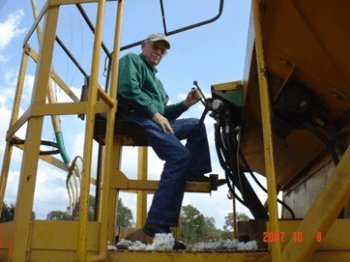 With the module builder system, harvested cotton was placed into a module builder, a container like machine that compressed cotton into an 8ft-wide x 8ft-high 24ft-long or an 8ft-wide x 8ft-high 32ft-long module, depending on if the cotton was picked or stripped, that was ready to be transported to the cotton gin without the use of conventional cotton trailers. This allowed the producer to harvest cotton in a timely manner where producers had the option to keep the more protected cotton module until transporting or store the modules at the gin until processing. This technique dramatically promoted increased harvesting rates and efficiency overall.
With the module builder system, harvested cotton was placed into a module builder, a container like machine that compressed cotton into an 8ft-wide x 8ft-high 24ft-long or an 8ft-wide x 8ft-high 32ft-long module, depending on if the cotton was picked or stripped, that was ready to be transported to the cotton gin without the use of conventional cotton trailers. This allowed the producer to harvest cotton in a timely manner where producers had the option to keep the more protected cotton module until transporting or store the modules at the gin until processing. This technique dramatically promoted increased harvesting rates and efficiency overall.
Dr. Parnell had yet another challenge in educating producers. There was competition from Texas Tech that promoted another system where lightly compressed cotton was stored as a rick, a lengthy, often mile long stretch of cotton. Due to high wind speeds, the lightly compressed cotton was often susceptible to product loss. This technique, in addition to product loss from the wind, entailed high degrees of transportation costs as conventional cotton trailers were still the main form of transportation and the system itself only solved half of the problem.
With Dr. Parnell’s extensive knowledge of the cotton industry, he was asked to become a teaching and research faculty member with the Biological and Agricultural Engineering Department in 1978. During his time with the department, Dr. Parnell taught classes in air pollution engineering, systems analysis in food and agriculture, and continuing professional development courses. Additionally, he held the title of Director of the Center for Agricultural Air Quality Engineering and Science as well as the holder of the Endowed Cotton Engineering, Ginning, and Mechanization Chair. During this time, he also led the development of the 1D3D cyclone, which is used extensively as best available control technology to reduce dust emissions from industrial and agricultural facilities.
Dr. Parnell is part of 13 scientific societies and has participated in over 25 committees. He has participated in several selected service activities including being appointed by the Texas Governor to serve on the Texas Air Control Board from 1990-1994, as well as appointed by the Secretary of Agriculture to the Task Force on Air Quality from 1997-2006. He has been consulted in over 15 cases including several grain and flour dust explosions and even an arsenic contamination case, as well as provided testimonies that included an OSHA oversight in a grain elevator explosion. He is also the co-owner of two patents relating to biomass thermochemical conversion systems.
Dr. Parnell participated in editorial activities for ASAE and the USDA, as well as is the holder of 59 refereed journal and peer review articles, 7 books, 145 selected final reports of research projects, 154 selected presentations and papers, 143 selected proceedings, and refereed 56 publications of his graduate students’ theses. He has also received grants for 27 research projects including funds from the National Science Foundation, General Mills, the Cotton Foundation, Texas Cattle Feeders Association, National Cattlemen’s Beef Association, and the Texas Natural Resource Conservation Commission. His awards and honors total more than 20 which includes the Dean’s Outstanding Achievement Award for Excellence in Teaching, Outstanding Engineer Award, Superior Service Award, and several Paper Awards.
After decades of hard work, Dr. Parnell’s retirement is well deserved. Though he will remain on as a Professor Emeritus and may do some limited consulting on the side, Dr. Parnell wishes to focus his attention on his family, take up a few hobbies, and do some light traveling. He has four grandchildren and is anxious to be able to spend more time with them and watch them grow. We wish him and his family well as he continues his next chapter. Thank you for the memories Dr. Parnell.
